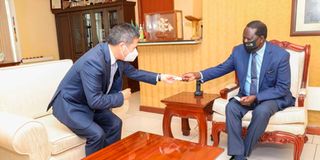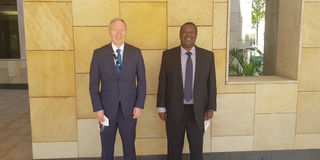Premium
State House battle: Top politicians 'charm the West'

Former Prime Minister Raila Odinga during a meeting with EU ambassador Simon Mordu at his Capitol Hill offices in Nairobi on September 9, 2020 where they had discussions on matters of mutual interest to their country and region.
What you need to know:
- Even though Mr Odinga is yet to officially declare his interest in the top seat, his actions point to a leader keen on another attempt at the presidency in next year’s election.
Orange Democratic Movement (ODM) leader Raila Odinga on Wednesday hosted acting US ambassador to Kenya, Mr Eric Kneedler, even as it emerged that leading presidential aspirants have launched a diplomatic charm offensive ahead of the 2022 General Election.
Even though Mr Odinga is yet to officially declare his interest in the top seat, his actions point to a leader keen on another attempt at the presidency in next year’s election.
“The time for politics will come. For now, let us pass the Building Bridges Initiative (BBI) bill,” Mr Odinga said, adding “I will only run if I have chances of winning”.
Mr Odinga hosted the acting ambassador at his Capitol Hill office in Nairobi.
“Our discussion touched on the US-Kenya ties under the (Joe) Biden administration; the Covid-19 pandemic and the envisaged constitutional reforms in our Country,” he said after the meeting.
Mr Odinga has hosted several EU ambassadors at his Capitol Hill office over the last few months.
On February 3, the ODM leader hosted a delegation led by the Indonesian Ambassador Mohamad Hery Saripudin and their Permanent Representative to Unep and the UN Habitat.
“Our discussions touched on the role UN bodies play on the African continent and around the world,” Mr Odinga announced on his Twitter page.
On November 10, 2020, the former Prime Minister held talks with China’s ambassador to Kenya Zhou Pingjian at his Capitol Hill offices where they discussed local and global issues, including the BBI report and search for Covid-19 vaccine.
Asked about the meetings and the goal, ODM Secretary-General Edwin Sifuna noted that apart from being the ODM leader, Mr Odinga also serves as African Union High Representative for infrastructure Development and “meets the envoys in his capacity as the AU official”.

ODM leader Raila Odinga with Chinese Ambassador to Kenya Zhou Pingjian, when the envoy paid him a courtesy call at his office in Capitol Hill, Nairobi, on November 10, 2020.
Ruto and Mudavadi
Deputy President William Ruto and Amani National Congress (ANC) leader Musalia Mudavadi have also been meeting diplomats as they seek to boost their influence beyond national politics.
On September 24, 2020, Dr Ruto was also hosted by 13 European Union (EU) ambassadors at the residence of the EU Ambassador to Kenya, Mr Simon Mordue.
“Delighted to have hosted Deputy President William Ruto at a meeting of EU ambassadors. Enjoyed the lively and open exchange of views on the Big Four Agenda, and Kenya’s development and political future [sic],” Mr Mordue tweeted last September.
The meeting with the foreign envoys followed several others, including one with the former US ambassador to Kenya, Mr Kyle McCarter.
Mr Mudavadi hosted the acting US ambassador to Kenya on January 26.
“We engaged on a wide range of issues touching on matters of US partnership and how to build on the over 55 years of friendship between Kenya and the US, on matters security, health, education, trade and much more.”
Two Weeks ago, Mr Mudavadi was hosted by European Union ambassadors as well as the Royal Dannish Ambassador, Mr Ole Thonke.
“The meeting brought together ambassadors of EU member states. We discussed matters of common concern that call for a multilateral approach. Emerging development challenges were shared and mitigation strategies explored,” Mr Mudavadi said after the meeting on February 3.
The meeting came hot on the heels of one with Australian High Commissioner Luke Williams, which took place the day before.
“We talked about strengthening bilateral relations between the two countries particularly people-to-people around security, trade, investments, education, support for women and youth initiatives,” he said.
ANC deputy party leader, Ayub Savula said Mr Mudavadi is at the forefront in the 2022 succession politics, “hence the need to reach out and develop ties with all likeminded individuals and nations.”

A file photo of Deputy President William Ruto with European Union Ambassador Simon Mordue during their meeting at the DP's official residence in Karen, Nairobi.
The West’s significance
Political analysts see the meetings by Dr Ruto, Mr Odinga and Mr Mudavadi as a strategy to woo the West ahead of their march to State House.
Prof David Kikaya, a former ambassador and professor of International Relations at the United States International University (USIU), leading presidential contenders are keen on winning the confidence of the West for continuity.
“Given that Kenya's historic development partners are the West, it certainly is prudent that presidential aspirants elicit their confidence for continuity,” he told the Nation.
“The subject matter of the discourse seems to target a specific audience. From the DP’s meetings, for instance, it appears that the clarity of his position on the BBI is at the centre stage. With Raila, the focus appears to be his special mission on the continent's infrastructure connectivity while the issues of inclusive governance and accountability identified with Mr Mudavadi seem to have triggered the chain of invitations to have an audience with him.”
Political analysts Javas Bigambo, Mark Bichache and Dismas Mokua argue that any serious candidate requires support across the board and must also reach out to the “big brothers” ahead of the 2022 contest.
Prof Macharia Munene of USIU describes the meetings as “an old habit for potential leaders to try to assure powerful countries that they can be relied on not to rock the Western interests in Kenya”
“Any serious presidential candidate requires serious deposits in the bank of endorsements or support,” Mr Bigambo says, adding that Dr Ruto, Mr Odinga and Mr Mudavadi are angling to demonstrate that they have important ties abroad, especially in the West, which is always traditionally seen as the bastion of democracy.
“The West also finances various development projects in Kenya through partnerships, so building ties remains unavoidably consequential. It also bolsters citizens' confidence in the candidate about international linkages. Diplomatic charm is beneficial to the candidate in the long term,” Mr Bigambo told the Nation.
Mr Bichache said, “To become president is to become the chief diplomat of the nation. It is important to have goodwill from donors who support our health, army and the fight against terror.”
“It is also key to note that many nations have political party support programmes that can enrich a political campaign. These programmes essentially subsidise the cost of campaigns (although not in cash), train campaign stuff and help in research,” he said.
Beyond that being taken seriously by foreign ambassadors, he noted, the meetings also show the public that one is a serious candidate.

Amani National Congress leader Musalia Mudavadi during his meeting with Australian High Commissioner Luke Williams at the High Commission on February 2, 2021.
“Selfish interests”
For Mr Mokua, Nations all over the world want to start building bridges with Kenya’s fifth president.
“It serves their selfish interests and they must align early in the day with the likely fifth president. They use their systems to identify top candidates and start establishing relationships,” Mr Mokua told the Nation.
Nations all over the world, he said, are pursuing their national interests, which explains why they are keen on meeting top presidential candidates.
“Candidates holding court with Western envoys have a leg up in the 2022 race. They have brand recognition in Western cities. This is important in international relations and useful in repairing Kenya’s economic growth. Such brand recognition is useful in debt rescheduling, having conversations with Bretton Woods institutions and opening up new markets under bilateral and multilateral structures.”
Mr Mokua added that Western envoys can also discuss best practices with the 2022 candidates, which “is useful as they prepare their manifestos”.
The US, he added, is very keen on security conversations while the rest place a premium on bilateral trade.
Prof Macharia Munene of USIU says the possibility of support through finances and in kind, through non-governmental organisations and civil society organs, is another factor to consider when discussing why leaders want to reach out to the Western nations.
“Each is also aware of the damage the West can inflict on campaigns simply by making negative comments,” Prof Munene said.
However, a European Union (EU) spokesperson based in Nairobi told the Nation that diplomats only meet stakeholders on partnership programmes meant for the benefit of the public.
“I would say that generally, diplomats maintain contact with stakeholders from all walks of life including the private sector, the civil society and actors across the whole political spectrum,” the spokesperson said.





